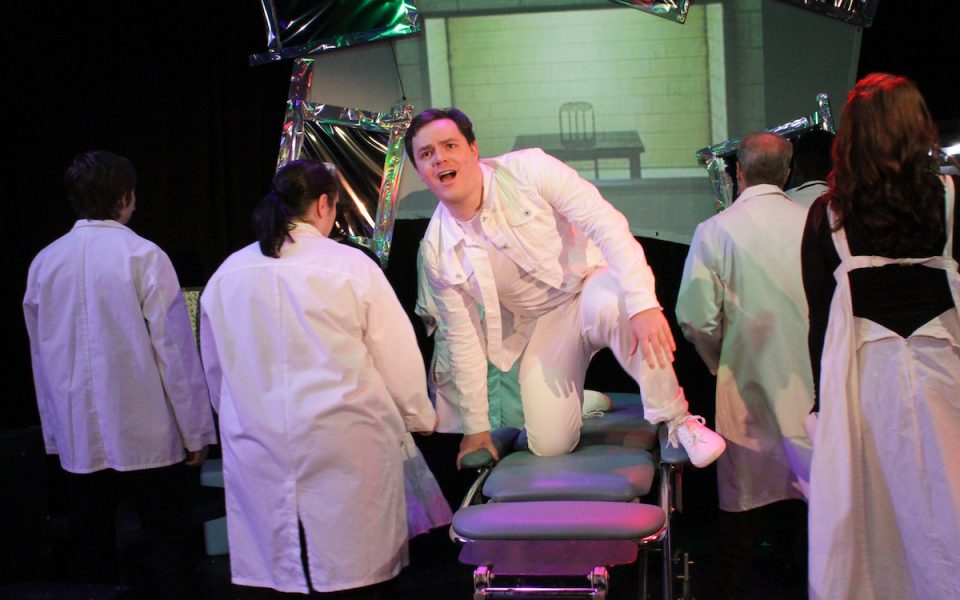The Pinball Wizard began as just Tommy.
In the newest production from the Winston-Salem Theatre Alliance, Tommy’s climb to his own identity plays out across the stage. The troupe’s performance of The Who’s Tommy shared the titular character’s coming-of-age journey through a classic rock opera.
Using the The Who’s 1969 album by the same name, the musical tells the struggles and victories of young Tommy Walker, who witnesses a murder as a toddler, and the psychosomatic symptoms that arise because of it.
After the shock of the gunshot wears off, the Walker parents look at each other, and then turn Tommy around, telling him how to handle everything. They repeat the instructions, unaware that it will cause the boy to become blind, deaf and mute.
“You didn’t hear it. You didn’t see it,” they sing. “You won’t say nothing to no one.”
Director Jamie Lawson worked closely with the actors of the Theatre Alliance to set the tone. Though trauma drives a great deal of the plot, the focus lies on the upward swing of Tommy’s recovery.
“It is a great story of redemption,” Lawson said.
The height comes unexpectedly. Amid additional harm from a manipulative uncle and a bully of a cousin, Tommy finds himself in a rec hall, ignored by his cousin. Isolated from the noise and socialization, Tommy finds his hands on the sides of a pinball machine.
Here he becomes the “Pinball Wizard,” the teens sing as Tommy transforms into a spectacle. The game becomes a coping mechanism — an emotional-support arcade fixture. The scene is infectious, the dancers revving up the hype as the somewhat stiff child racks up high scores.
It acts as a victory song, an illustration of how people find their own pinball machines, their own ways to get through the hurdles in front of them. Lawson believes the universal nature of the need to process and express emotional stress makes Tommy’s unusual story accessible.
“What Tommy goes through — these are all situations we encounter today, unfortunately.” Lawson said. “Bullying, dysfunctional family life, this is what we still struggle with.”
The stage itself becomes an access point to Tommy’s perspective. As the scenes shift to his thoughts, the microphones of other actors become muffled, muddied voices echoing to the audience like they would to Tommy himself. On the black backdrop, a projector flashes images — barbed wire, a cheering crowd, a hospital room. Each sets the scene, but still feels faint, paralleling Tommy’s own blindness.
Surrounding the projections, multiple pieces of plastic shine in the stage lights, held up by iridescent duct tape, shrouding the images in a faint glow. They appear like the mirrors Tommy stares into through his adolescence and his twenties. It is only when the mirror shatters that Tommy begins to sense again.

Lawson sees the story as one of cause and unintentional effect. From the psychosomatic symptoms that drive Tommy’s childhood, to discovering pinball, each plot moment is accidental. Even after Tommy regains his senses, he attracts fans, unexpectedly becoming famous.
“It’s because we all interact with other humans, we’re always going to have that effect on each other,” Lawson said. “So, be nice, and kind to one another.”
In the end, Tommy ends up with his core family again, after fans grow disillusioned and the spotlight shifts away. He wears all white, like the 10-year old who steps out onto one side of the stage. From the opposite end, the toddler walks out.
Here, he sings to his family, but mostly he seems to sing to himself.
“Listening to you,” he sings, “I get the music.”
Join the First Amendment Society, a membership that goes directly to funding TCB‘s newsroom.
We believe that reporting can save the world.
The TCB First Amendment Society recognizes the vital role of a free, unfettered press with a bundling of local experiences designed to build community, and unique engagements with our newsroom that will help you understand, and shape, local journalism’s critical role in uplifting the people in our cities.
All revenue goes directly into the newsroom as reporters’ salaries and freelance commissions.


Leave a Reply